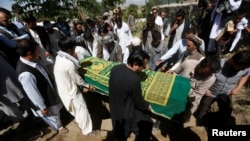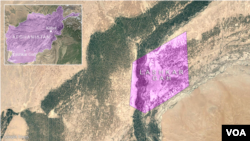A roadside bombing in Afghanistan’s southern Helmand province Friday killed an Afghan journalist and wounded another, the police said.
The explosion took place in the provincial capital of Lashkar Gah around 10 a.m., according to police inspector Haji Garan. The blast killed Naimatullah Zaheer, a reporter with the Aryana news television. The inspector did not identify Zaheer’s wounded colleague or the colleague’s media outlet.
The reporters were among a group of local journalists driving to an area where there was intense fighting with the Taliban the previous night. Zaheer was parking the car when the blast went off, Garan said.
No one immediately claimed responsibility for the attack.
President Ashraf Ghani condemned the killing of Zaheer, saying in a statement that “such terrorist attacks cannot stop media freedoms in Afghanistan or weaken the country’s media” sector.
Media advocates say that 2016 has been the deadliest year yet for journalists in Afghanistan. According a figure released by the Afghan Journalists Safety Committee, at least 11 journalists have been killed in Afghanistan so far this year, the highest annual death toll on record. That death toll does not include Friday’s fatality.
AJSC figures show that more than 60 journalists have been killed in the past 16 years in Afghanistan. That includes journalists killed in conflict, targeted by unknown gunmen or murdered. Many cases have not been investigated.
The AJSC has demanded that the Afghan government end the culture of impunity surrounding journalist deaths. The committee warned that otherwise the country will lose its vibrant local media, one of Afghanistan’s greatest achievements since the 2001 fall of the Taliban.
Since the beginning of this year’s fighting season, the Taliban have expanded their footprint across Helmand. The province is also strategically important for the Taliban as the main source of the country’s opium output, worth an estimated $4 billion a year, much of which funds the insurgency.





